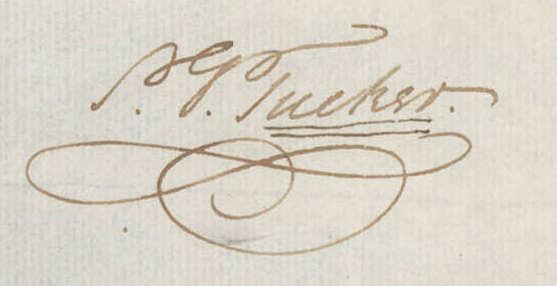St. George Tucker's Queries on Slavery in Massachusetts
~Nathaniel Appleton, 26 February 1795
 Letter from St. George Tucker to Jeremy Belknap (with enclosed queries), 24 January 1795
Letter from St. George Tucker to Jeremy Belknap (with enclosed queries), 24 January 1795
In January of 1795, St. George Tucker, a Virginia judge, wrote to the founder of the Massachusetts Historical Society, Boston clergyman and scholar Jeremy Belknap. This letter included a set of eleven queries regarding the history of slavery in Massachusetts. An abolitionist, Tucker was interested in the advent and eventual abolition of slavery in New England (and Massachusetts in particular), hoping that he could use the information to help bring an end to slavery in Virginia.
At Tucker's request, Belknap circulated a list of the queries to a number of prominent Massachusetts citizens, including Vice President John Adams. Belknap compiled the responses into a document that he forwarded to Tucker in April 1795. Belknap's responses (see online presentation of his manuscript draft) were also published in the Collections of the Massachusetts Historical Society, first series, volume IV in 1795.
In addition to Belknap, many of the respondents were early members of the Massachusetts Historical Society. The letters from this dialogue, as well as draft manuscripts of both the circular letter and compiled responses, form part of the Jeremy Belknap papers at the Massachusetts Historical Society. The bulk of these responses, as well as Tucker's original queries, were published in the Collections of the Massachusetts Historical Society, fifth series, volume III, 1877. Additionaly, the correspondence between Belknap and Tucker continued for many months after Belknap sent his compiled responses. Their dialogue on slavery and abolition reveals a great deal about race relations in the eighteenth century. St. George Tucker was eventually voted a corresponding member of the Historical Society; a distinction he politely declined.
 Letter from John Adams to Jeremy Belknap, 21 March 1795
Letter from John Adams to Jeremy Belknap, 21 March 1795
 Letter from Nathaniel Appleton to Jeremy Belknap, 26 February 1795
Letter from Nathaniel Appleton to Jeremy Belknap, 26 February 1795
Most of the men queried by Tucker and Belknap were adamant in their belief that slavery as an institution was morally wrong. However, they tempered their beliefs with fears related to the economic condition of freed Black people, and the perceived problems associated with civil rights. In a letter to Jeremy Belknap dated 21 March 1795, John Adams suggested that "[j]ustice" for enslaved people, would mean not only freedom, but that "they should not be abandoned by their Masters and turned loose upon a world in which they have no capacity to procure even a subsistence." In a letter dated 26 February 1795, Nathaniel Appleton stated that he "heartily [pitied] the Southern States that still suffer the evil of Slavery."
However, some other responses illustrate the difficult and prejudicial state of race relations in the 1790s. James Winthrop, in a letter dated 4 March 1795, stated that although some African Americans had produced literary works that were "not contemptible," they were not "estimated for speculative abilities." In a letter to Jeremy Belknap dated 27 November 1795, Tucker himself said that "Blacks and Mulattoes should be excluded from all the valuable rights of Citizenship" and that "narrow as this policy may appear, I am persuaded it is necessary for the preservation of the peace of Society." He proposed using this denial of equal citizenship (along with other means) to prompt formerly enslaved people to leave the United States.
This collection of letters, queries, and printed materials is also noteworthy from a historiographical perspective because it contains the recollections and opinions of people who lived through the end of slavery in Massachusetts. It provides multiple contemporary sources of information about slavery in colonial Massachusetts written by some of the most prominent citizens of the Commonwealth.
Tucker's request and responses gathered by Belknap
- Letter from St. George Tucker to Jeremy Belknap (with enclosed queries), 24 January 1795
- Queries about slavery in Massachusetts (manuscript copy) and draft letter to potential respondents by Jeremy Belknap, 17 February 1795
- Letter from John Eliot to Jeremy Belknap (on printed circular with queries about slavery in Massachusetts), [February 1795]
- Letter from Samuel Dexter to Jeremy Belknap, 23 February 1795
- Letter from Samuel Dexter to Jeremy Belknap, 26 February 1795
- Letter from Nathaniel Appleton to Jeremy Belknap, 26 February 1795
- Letter from James Winthrop to Jeremy Belknap, 4 March 1795
- Letter and enclosure from Edward A. Holyoke to Jeremy Belknap, 19 March 1795
- Letter from Thomas Pemberton to Jeremy Belknap, 12 March 1795
- Letter from Samuel Dexter to Jeremy Belknap, 19 March 1795
- Letter from John Adams to Jeremy Belknap, 21 March 1795
- Letter from James Sullivan to Jeremy Belknap, 9 April 1795
Belknap's answers to Tucker's questions
- Queries respecting slavery in Massachusetts with answers (manuscript draft) by Jeremy Belknap, [April 1795]
- "Queries Respecting the Slavery and Emancipation of Negroes in Massachusetts, Proposed by the Hon. Judge Tucker of Virginia, and Answered by the Rev. Dr. Belknap," from the Collections of the Massachusetts Historical Society, first series, volume 4, 1795
Ongoing discussion (via correspondence)
- Letter from St. George Tucker to Jeremy Belknap, 11 April 1795
- Letter from James Sullivan to Jeremy Belknap, 30 July 1795, with letter from St. George Tucker, 10 February 1796
- Letter from St. George Tucker to Jeremy Belknap, 29 June 1795
- Letter from John Adams to Jeremy Belknap, 22 October 1795
- Letter from St. George Tucker to Jeremy Belknap, 31 October 1795
- Letter from St. George Tucker to Jeremy Belknap, 27 November 1795

